分词作状语典型例句背诵
分词作状语的用法讲解归纳
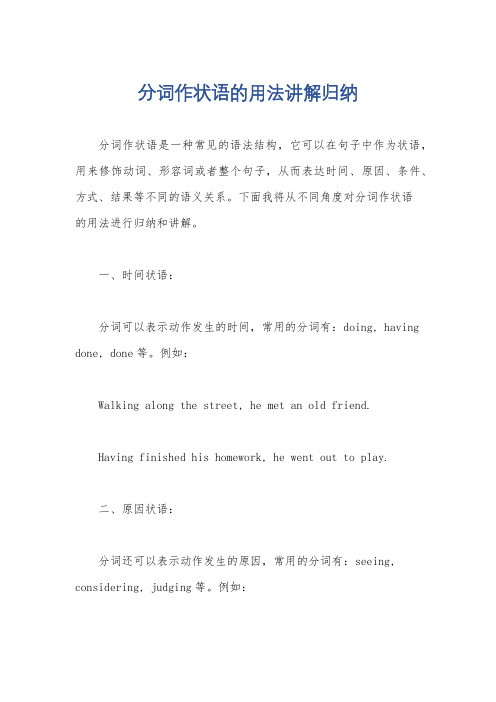
分词作状语的用法讲解归纳分词作状语是一种常见的语法结构,它可以在句子中作为状语,用来修饰动词、形容词或者整个句子,从而表达时间、原因、条件、方式、结果等不同的语义关系。
下面我将从不同角度对分词作状语的用法进行归纳和讲解。
一、时间状语:分词可以表示动作发生的时间,常用的分词有:doing, having done, done等。
例如:Walking along the street, he met an old friend.Having finished his homework, he went out to play.二、原因状语:分词还可以表示动作发生的原因,常用的分词有:seeing, considering, judging等。
例如:Seeing the heavy rain, she decided to stay at home.Considering the bad weather, we canceled the picnic.三、条件状语:分词还可以表示动作发生的条件,常用的分词有:supposing, provided, given等。
例如:Supposing the weather is fine, we will go for a picnic.Provided that you finish your work, you can go out to play.四、方式状语:分词还可以表示动作发生的方式,常用的分词有:speaking, running, working等。
例如:He ran to catch the bus, panting heavily.She answered the question, smiling brightly.五、结果状语:分词还可以表示动作的结果,常用的分词有:surprised, pleased, excited等。
例如:The news, surprising everyone, spread quickly.The children, pleased with the gifts, thanked their parents.总结起来,分词作状语的用法非常灵活多样,可以用来表示时间、原因、条件、方式和结果等不同的语义关系,丰富了句子的表达方式。
分词作状语的特殊结构
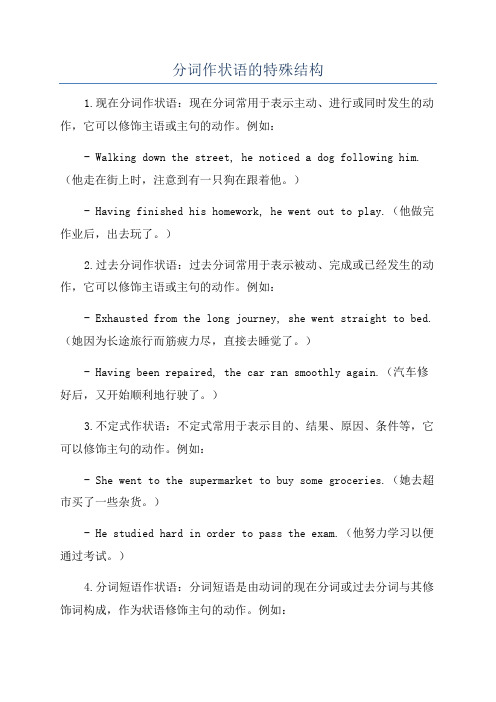
分词作状语的特殊结构1.现在分词作状语:现在分词常用于表示主动、进行或同时发生的动作,它可以修饰主语或主句的动作。
例如:- Walking down the street, he noticed a dog following him.(他走在街上时,注意到有一只狗在跟着他。
)- Having finished his homework, he went out to play.(他做完作业后,出去玩了。
)2.过去分词作状语:过去分词常用于表示被动、完成或已经发生的动作,它可以修饰主语或主句的动作。
例如:- Exhausted from the long journey, she went straight to bed.(她因为长途旅行而筋疲力尽,直接去睡觉了。
)- Having been repaired, the car ran smoothly again.(汽车修好后,又开始顺利地行驶了。
)3.不定式作状语:不定式常用于表示目的、结果、原因、条件等,它可以修饰主句的动作。
例如:- She went to the supermarket to buy some groceries.(她去超市买了一些杂货。
)- He studied hard in order to pass the exam.(他努力学习以便通过考试。
)4.分词短语作状语:分词短语是由动词的现在分词或过去分词与其修饰词构成,作为状语修饰主句的动作。
例如:- The boy ran into the room, crying loudly.(那个男孩跑进房间,大声哭着。
)- The car skidded on the wet road, causing an accident.(汽车在湿滑的路上打滑,导致了一起事故。
)这些特殊结构的分词作状语可以增加句子的信息量,使句子更加丰富和生动。
分词做状语的句子举例(英语)由于...

分词做状语的句子举例(英语)由于...英语语法——分词作状语1. 分词作状语实际把状语从句简化.简化的条件:其逻辑主语一定要与主句的主语保持一致.While he was reading the book, he nodded from time to time.----Reading the book, he nodded from time to time.Because he was shy, he didn’t e to the party.----Being shy, he didn’t e to the party.As the book is written in simple English, the book is easy to read.----Written in simple English, the book is easy to read.2. 分词作状语时可分为以下几种形式:* doing :用来表示主动,且前后动作同时进行.Returning home later, my friend learned that the police had been to the flat.* having done: 用来表示主动,且动作发生在主句之前.Having seen the film before, I decided not to see it again.* being done: 用来表示被动,且前后动作同时进行.Being questioned by the police, he felt frightened.* done: 用来表示被动且完成Destroyed in the storm, the house will be rebuilt.* having been done: 用来表示被动,而且强调动作持续一段时间或次数.Having been defeated three times, he had to give up.* 否定形式: not/ never + 分词结构Not studying hard, he didn’t pass the test.Never having taken a plane before, he was nervous.3. 分词作状语如果前后主语一致可简化时间、条件、原因、结果和伴随等状语从句.(条件)If you work harder, you will do better in the exam next time.---- Working hard, you will do better in the exam next time.(时间)After I did my homework, I went back home.----Having done my homework, I went back home.(伴随)He hurried to the station and hoped to catch the last train.---- He hurried to the station, hoping to catch the last train..(原因)Because my friend was frightened of losing his job, he said nothing to the police.----Frightened of losing his job, my friend said nothing to the police.(结果)His parents were killed in the SARS epidemic and left him an orphan.---- His parents were killed in the SARS epidemic, leaving him an orphan.注意:分词不做目的状语,只有动词不定式可以.To get high marks in the mid-exam, he cheated.To be listed on the top of 500 largest enterprises in the world, a pany should meet the following requirements.Not to forget the key points, he wrote them down.Exercises:1. The plane crashed and killed 120 lives.--The plane crashed, killing120 lives.2. I suffered a headache yesterday, so I wasn’t in a good mood.--Suffering from a headache yesterday, I wasn’t in a good3. When I saw them, I went down to meet them.--Seeing them, I went down to meet them.4. Because he has lived in Beijing for many years, he knows the city very well.--Having lived in Beijing for many years, he knows the city very well.5. Because it is recorded on the tape, the dictionary is available to the blind.n Recorded on the tape, the dictionary is available to the blind.n6. As I was troubled by my conscience, I wrote a letter to the teacher counselor.-- Troubled by my conscience, I wrote a letter to the teacher counselor.7. When you are being spoken to, you should look at the other.--Being spoken to, you should look at the other.8. After Miss Zhong explained the text, it became clearer to us.--Explained by Miss Zhong , the text became clearer to us.4. 注意过去分词作状语的用法: 一般认为, 无论在从句中的动词是被动语态还是过去分词作形容词, 都直接用过去分词.As he is tired, he wants to sit down and relax.--Tired, he wants to sit down and relax.As he is born and brought up in a big city, he knows nothing about farming.--Born and brought up in a big city, he knows nothing aboutHe came in to the room and he was very excited.--He came in, excited.As he was filled with confidence, he left a good impression on the interviewers.--Filled with confidence, he left a good impression on …He is walking along the street and a sorry-looking dog is following him.---He is walking along the street, followed by a sorry-looking dog.If we see the earth from the moon, it looks like a water ball.----Seen from the moon, the earth looks like a water ball.5.当状语从句中的动作发生的时间早于主句的动作, 分词短语可用having+ 过去分词完成形式,(一般用于时间和原因), 但注意下例动词可不用以上结构. (know, hear, see, arrive, learn等)Not knowing where he was, I had to go alone.Learning that he won’t e, I don’t what to do.Hearing the sad news, I felt disappointed.Arriving at the station, I found the last train gone.6. 为了便于理解, 有些连词可仍然放在分词短语的前面.1. While going to school, I met my former clas ... ate.2. Once seen, it won’t be forgotten.3. Though tired, he is still in high spirits.4. If heated, the metal expands.6. If playing all day, you will waste your valuable time.7. He stood there as if remembering something.8. I won’t go there unless invited.9. I won’t spea k to Miss Zhong until spoken to first.10. When asked if I had knocked the pot to the ground, I denied.注意: 有些连词不能保留,只能用介词.As soon as I discovered the error, I went back to tell her about it.On discovering the error, I went back to tell her about it.Before he was interviewed, he had got well prepared.Before being interviewed, he had got well prepared.After the girl was operated on, she came to.After being operated on, she came to.7. 分词作状语时,分词的逻辑主语必须与主句的主语保持一致.When hearing the news, tears came down.Right: When I heard the news, tears came down.While learning English, a good dictionary is necessary.Right: While we are learning English, a good dictionary is necessary.Since moving to Bejing, we haven’t heard from him.Right: Since he moved to Beijing, we haven’t heard from him.注意:但一些分词短语无需考虑前后主语一致,永远保持固定结构. 如:generally speaking ;strictly speaking speaking of ;judging from ;provided that…. ;talking of…considering…; given….; supposing that…1. General speaking, the weather in Shanghai is mild.2. Considering her age, she looks old.3. Judging from his abilities, he can do the job.4. Speaking of Britain, it is separated from Europe by the English Channel.5. Provided that he fails to e, what shall we do?下列句子对吗?1).Trying again, and you will have a fresh idea.错误. 分词作状语是非谓语,而非句子,因此与主句之间不再添加连词.Trying again, you will have a fresh idea.Try again, and you will have a fresh idea.If you try again, you will have a fresh idea.2.) He got off the bus, bought some fruit and went home.正确. 当几个动作连续发生时,时态保持一致,最后两个动作之间用and 连接.3. ) He fell off the bicycle, hurt his leg.错误. 在这儿hurt his leg 时结果状语,而且动作是主动的.He fell off the bicycle, hurting his leg.8. 独立主格结构:有时状语从句与主句之间的主语不一致,而且也无法调整,那么除了用状语从句之外,也可用独立主格结构,即保留从句的主语,省略连词,用分词作非谓语.After the job was done, they went back home.--The job done, they went back home.As there was nothing to do, we sat there talking.--There being nothing to do, we sat there talking.If time permits, we will visit another place.--Time permitting, we will visit another place.As the problem was settled, the meeting was over.--The problem settled, the meeting was over.。
高中英语知识点归纳分词作状语的常见形式
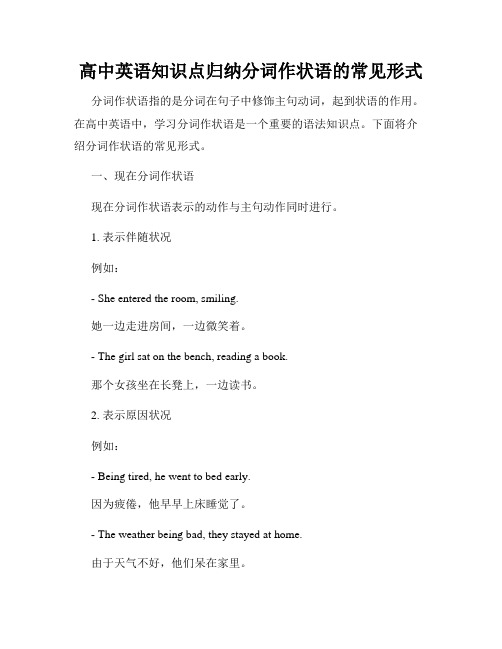
高中英语知识点归纳分词作状语的常见形式分词作状语指的是分词在句子中修饰主句动词,起到状语的作用。
在高中英语中,学习分词作状语是一个重要的语法知识点。
下面将介绍分词作状语的常见形式。
一、现在分词作状语现在分词作状语表示的动作与主句动作同时进行。
1. 表示伴随状况例如:- She entered the room, smiling.她一边走进房间,一边微笑着。
- The girl sat on the bench, reading a book.那个女孩坐在长凳上,一边读书。
2. 表示原因状况例如:- Being tired, he went to bed early.因为疲倦,他早早上床睡觉了。
- The weather being bad, they stayed at home.由于天气不好,他们呆在家里。
3. 表示条件状况例如:- I will go to the park, weather permitting.天气允许的话,我会去公园。
- We went out, the rain having stopped.雨停了,我们出去了。
4. 表示方式、手段状况例如:- He ran to the bus stop, hoping to catch the bus.他跑到公交车站,希望能赶上公交车。
- The boy solved the math problem, using the formula he had learned.这个男孩用他学过的公式解了这个数学问题。
二、过去分词作状语过去分词作状语表示的动作发生在主句动作之前。
1. 表示时间状况例如:- Having finished his homework, he went out to play.他完成了作业后,出去玩了。
- We arrived at the airport, having missed the flight.我们到达机场时,航班已经错过了。
分词作状语例子
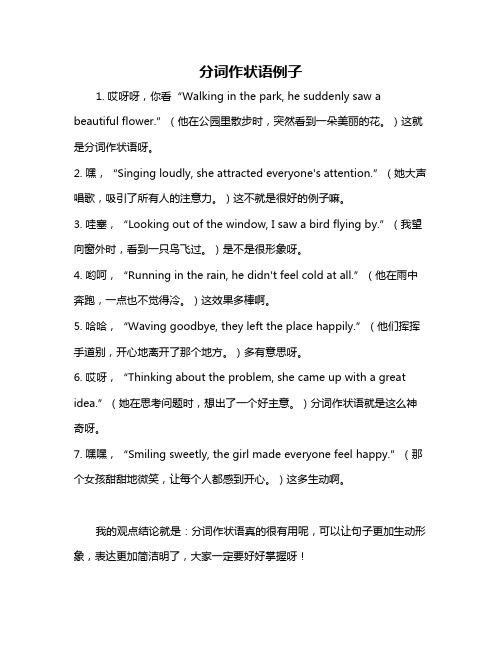
分词作状语例子
1. 哎呀呀,你看“Walking in the park, he suddenly saw a beautiful flower.”(他在公园里散步时,突然看到一朵美丽的花。
)这就是分词作状语呀。
2. 嘿,“Singing loudly, she attracted everyone's attention.”(她大声唱歌,吸引了所有人的注意力。
)这不就是很好的例子嘛。
3. 哇塞,“Looking out of the window, I saw a bird flying by.”(我望向窗外时,看到一只鸟飞过。
)是不是很形象呀。
4. 哟呵,“Running in the rain, he didn't feel cold at all.”(他在雨中奔跑,一点也不觉得冷。
)这效果多棒啊。
5. 哈哈,“Waving goodbye, they left the place happily.”(他们挥挥手道别,开心地离开了那个地方。
)多有意思呀。
6. 哎呀,“Thinking about the problem, she came up with a grea t idea.”(她在思考问题时,想出了一个好主意。
)分词作状语就是这么神奇呀。
7. 嘿嘿,“Smiling sweetly, the girl made everyone feel happy.”(那个女孩甜甜地微笑,让每个人都感到开心。
)这多生动啊。
我的观点结论就是:分词作状语真的很有用呢,可以让句子更加生动形象,表达更加简洁明了,大家一定要好好掌握呀!。
现在分词短语作状语的例句
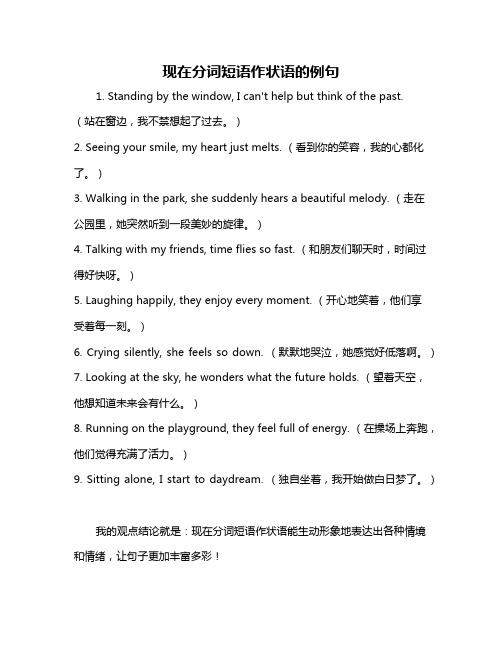
现在分词短语作状语的例句
1. Standing by the window, I can't help but think of the past.
(站在窗边,我不禁想起了过去。
)
2. Seeing your smile, my heart just melts. (看到你的笑容,我的心都化了。
)
3. Walking in the park, she suddenly hears a beautiful melody. (走在公园里,她突然听到一段美妙的旋律。
)
4. Talking with my friends, time flies so fast. (和朋友们聊天时,时间过得好快呀。
)
5. Laughing happily, they enjoy every moment. (开心地笑着,他们享
受着每一刻。
)
6. Crying silently, she feels so down. (默默地哭泣,她感觉好低落啊。
)
7. Looking at the sky, he wonders what the future holds. (望着天空,他想知道未来会有什么。
)
8. Running on the playground, they feel full of energy. (在操场上奔跑,他们觉得充满了活力。
)
9. Sitting alone, I start to daydream. (独自坐着,我开始做白日梦了。
)
我的观点结论就是:现在分词短语作状语能生动形象地表达出各种情境和情绪,让句子更加丰富多彩!。
分词作状语的例句
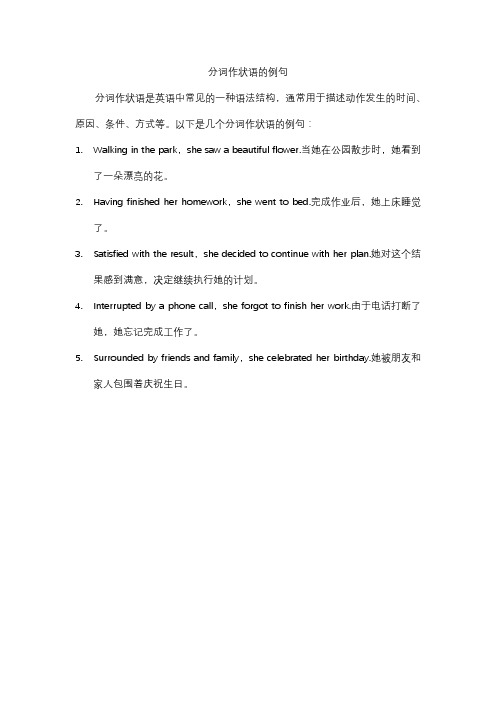
分词作状语的例句
分词作状语是英语中常见的一种语法结构,通常用于描述动作发生的时间、原因、条件、方式等。
以下是几个分词作状语的例句:
1.Walking in the park,she saw a beautiful flower.当她在公园散步时,她看到
了一朵漂亮的花。
2.Having finished her homework,she went to bed.完成作业后,她上床睡觉
了。
3.Satisfied with the result,she decided to continue with her plan.她对这个结
果感到满意,决定继续执行她的计划。
4.Interrupted by a phone call,she forgot to finish her work.由于电话打断了
她,她忘记完成工作了。
5.Surrounded by friends and family,she celebrated her birthday.她被朋友和
家人包围着庆祝生日。
分词短语作状语详细

首先要知道什么是分词.分词就是动词 ing或 ed的形成,称为现在分词和过去分词.既然分词是由动词变化而来,那么它就继承了动词原有的属性,即:可以带宾语或状语.这就构成了分词短语.分词也称为非谓语动词,不可以作谓语,但可以作定语、状语、补语、表语.下面举例说明:一、分词短语作定语,短语我用括号表示:①The man (standing in front of our classroom)is our headmaster.站在我们教室前面的那个人是我们的校长.②The police found the car (stolen from a rich businessman).警察找到了从富商那被盗走的汽车.二、分词短语作状语:①(Walking in the field),he noticed an unusual flower.正在田野走着,他发现了一种不同寻常的花.②(Tired of cooking),the Smiths went to a restaurant to have dinner.讨厌做饭,史密斯一家去了饭店吃饭.三、作补语:① I heard someone (singing loudly outside).我听到外面有人高声唱歌.② I found my room (broken into ).我发现有人进入过我的房间.四、作表语:① Your story is (quite interesting).你的故事很有趣.② The bridge was (badly damaged in the earthquake).桥梁在地震中严重受损. 最后提醒:分词短语作表语与被动语态很相似,容易弄混.被动语态强调动作,表语强调状态.状态是持续的,动作是短暂的.CH-分词短语作状语以及不定式作状语Period 1:分词短语作状语1.什么是状语:修饰动词、形容词、副词等及其短语或整个句子,说明动作或特征的句子成分,叫做状语。
- 1、下载文档前请自行甄别文档内容的完整性,平台不提供额外的编辑、内容补充、找答案等附加服务。
- 2、"仅部分预览"的文档,不可在线预览部分如存在完整性等问题,可反馈申请退款(可完整预览的文档不适用该条件!)。
- 3、如文档侵犯您的权益,请联系客服反馈,我们会尽快为您处理(人工客服工作时间:9:00-18:30)。
区别 sleep 1. To sleep in the morning, Bob turned off the alarm. expose 2. Being exposed to sunlight for a long time does harm to our skin. expose 3. Having been exposed to sunlight for such a long time, the photo turned yellow. , 4. take Take Taking things as they are and you’ll enjoy every day of your life.
宾语+ 2) have +宾语 do/ doing/ done • get + 宾语 + to do/ doing/ done • make + 宾语 do/ done 宾语+ • leave/keep + 宾语 + doing/ done 3) find + 宾语 + doing / done
4) catch + 宾语 + doing 5) want + 宾语 + to do/( to be )done
• 1. ____ in the queue for half an hour, Tom suddenly realized that he had left his wallet at home.( 04全国) A. To wait B. Have waiting C. Having waited D. To have waited • 2. Finding her car stolen, ______. (01 沪) A. a policeman was asked to help B. the area was searched thoroughly C. it was looked for everywhere D. she hurried to a policeman for help
• 分词作补语
动词+宾语+补语 动词
1) look at/ see/ watch/ notice/ observe listen to / hear +宾语 do/doing/ done 宾语+ 宾语 feel a. I saw the girl cross the street and run away. b. I saw the girl crossing the street when the accident happened. c. I saw the girl punished by her father when I passed her door. to cross d. The girl was seen crossing punished
• 分词作定语 smell • 1. The flowers smelling sweet in the garden attract the visitors to the beauty of nature. • 2. Don’t use words, expressions , or phrases known only to people with specific know knowledge. • 3. There are hundreds of visitors waiting in wait front of the Art Gallery to have a look at his discussed yesterday paintings. discuss • 4. The problem being discussed now is of great importance. be discussed tomorrow to
• 5. If time permits, I will go and visit the zoo. • =Time permitting, I will go and visit the zoo. • 6. After he was scolded by the teacher, he finally admitted making a mistake. • =After(介词)being scolded by the teacher, he finally admitted making a mistake. • = Having been scolded by the teacher, he finally admitted making a mistake.
ቤተ መጻሕፍቲ ባይዱ
• 6. He sent me an e-mail, hoping to get hope further information. • 7. After a day of hard work, he went home, exhausted. exhaust
pleased/ delighted/ satisfied/excited/ interested annoyed/ surprised/ astonished/ shocked/ amazed/ puzzled/ confused frightened/ scared depressed /dissatisfied embarrassed / tired/ bored
